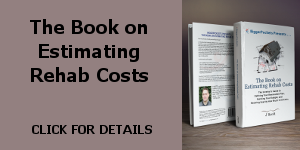Building Your Team
In real estate investment, a key differentiator — and often the difference between success and failure — is the ability to put together a great supporting team. Using whatever means necessary — networking contacts, other investors, referrals, and detailed research — it is imperative that you build a strong team of professionals to help you maximize your chances of success when flipping houses (or doing any type of real estate investing).
At very minimum, you find the following team members to help you with your investing:
Real Estate Attorney
- To define and create an initial business structure and entity for the company
- To provide legal advice and review contracts received from other professionals
- To create contracts to control property during due diligence
Certified Public Accountant
- To define and create an initial business structure and entity for the company
- To help create methodologies for tracking revenue and expenses
- To help identify tax strategies
- To complete annual taxes
Real Estate Agent
- To provide access to available properties (and MLS, if necessary)
- To provide insight into the local markets
- To identify and analyze available investments
Property Inspector
- To provide inspection services prior to purchase
- To help define cost of repairs and improvements
- To make strategic recommendations on improvements or repairs
Appraiser
- To help define comps and reasonable market value when dealing with non-typical properties or non-typical investments
Mortgage Broker or Lender
- For all financing needs and future finance planning
Title Company
- To clear title for acquired properties
Insurance Agent
- To provide insurance on investments
- To provide recommendations on insurance strategy for investments and tenants
General Contractor
- To help assess scope of work and costs for rehab projects
- To provide access to sub-contractors to perform your rehab




Your site is very helpful. Thank you for sharing!
Mr. Scott,
I am in the process of putting together my support team, composed of the professionals listed above.
My question is concerning brokers. I have done some research concerning the importance of picking the right broker, with a good reputation, who will work in favor of your (my) best interest. Do you have any advice on how to find these brokers through networking, etc? And maybe a good screening process in order to select the correct one?
Thank you for your time.
Hey Max,
I assume you’re talking about mortgage broker, correct? Unfortunately, there is no tried and true way to find a good mortgage broker — it’s all about asking for references from other people who know good brokers (especially other investors) and doing lots of “interviewing” of potential brokers to see how well-versed they are in the investor side of things.
For example, if you read on this blog about the FHA rules around flipping (the old 90-day rule, the requirements for second appraisals, etc), you’ll probably know more than 90% of the brokers out there do about FHA rules. So, if you can find a broker or two with that knowledge, you probably have one in the top 10%. Secondly, you want someone who is tremendously communicative — the worst trait of most brokers is that they won’t call you for two weeks during a deal, and you have no idea if things are going along smoothly or not.
Once you have a broker or two that seems to fit the bill, give him a try and see how he does. Any issues, cut him loose and move on — like I said, most brokers are horrible, and it may take a couple iterations to find someone great who will help you be successful!
I am trying to decide how necessary a broker is, I guess I will find out through experience. My next question is, which networks have you found to provide the most value to you? As far real estate associations, maybe even the chamber, etc. I am located in your neck of the woods, and was wondering what you would suggest.
Hi Max,
The advantage of a great mortgage broker is that you can get your buyers pre-qualified before you commit to taking your properties off the market for weeks at a time. Before we found a great broker, we’d routinely take the property off the market only to find that the buyer didn’t really qualify for a loan or the broker wasn’t competent enough to get it done. My current broker is amazing, and has NEVER told us that he could get a loan done for one of our buyers and then not delivered. We wouldn’t be nearly as successful without him.
I have been reading on your website for several hours and its very helpfull. I have my first flip on the market. My purchase price was 54k and its listed for 89k I have only 2k invested with my time doing the work. So my question for you is what location are you buying property? I know its different state to state but I live in a small town so my profit margin is not really big enough to pay a contractor so should I try to move closer to the city? I live in ohio so should I move toward Columbus or Cincinnati? I am currently buying forclosures and paying cash so I’m getting good deals for the area but there’s just not a big enough margin especially with an invester. Which leads me
to my last question what is your recommendation for a far return for an investor? I was thinking 10 to 15 percent.
Hi Luke,
Different areas are definitely going to provide different levels of opportunity to make money rehabbing houses. Certainly, there are advantages to larger towns/cities.
Given your example above, you purchase for $54K, put in $2K in work, presumably have about $12K in fixed costs and then sell for $89K, it sounds like you should be making over $20K in profit on that deal. If hiring the labor would have cost you $5K, that’s still over $15K in profit, which would be over 25% return, which is better than a lot of investors are getting these days. So, don’t discount your current market — it’s just a question of whether you can find enough of those deals to keep going.
As for a fair return for an investor, it really depends. If you’re inexperienced, don’t have any of your own cash and are not risking anything on the deal, giving 50% to the investor is not unreasonable. On the other hand, if you have experience, have some of your own cash invested and are taking some risk (offering a personal guaranty, for example), you may be able to just borrow the funds for 8-10%, thereby keeping a lot more of the profit.
It really depends on the situation and the people involved.
What about finding a real estate agent that will help locate deals? also i was impreesed with the exit srategies you discussed. how do I flip to an occupant?